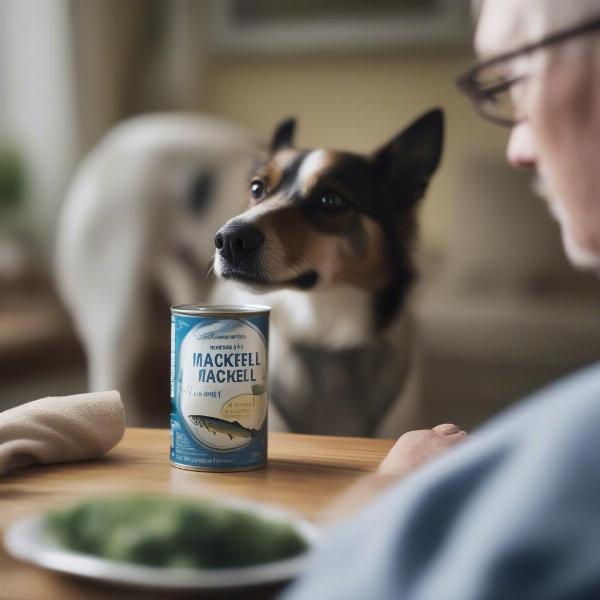Canned mackerel can be a tempting treat for our canine companions, but is it safe for them to indulge? Understanding the nutritional benefits and potential risks of feeding your dog canned mackerel is crucial for responsible pet ownership. This article will delve into the details, helping you make informed decisions about incorporating this fishy delight into your dog’s diet.
The Nutritional Value of Canned Mackerel for Dogs
Canned mackerel is packed with protein, omega-3 fatty acids, and essential vitamins and minerals. Omega-3s contribute to healthy skin and coat, while protein supports muscle development. Vitamins like B12 and D are also present in mackerel, supporting various bodily functions. However, not all canned mackerel is created equal.
The sodium content in canned mackerel can be a concern. Too much sodium can lead to health problems in dogs, including dehydration and high blood pressure. Therefore, choosing low-sodium or no-salt-added varieties is crucial. Additionally, some canned mackerel is packed in oil, which adds unnecessary calories and fat to your dog’s diet. Opt for mackerel packed in water whenever possible.
Can Dogs Eat Canned Mackerel in Oil?
While canned mackerel in oil is not toxic to dogs, it’s not the healthiest option. The added oil increases the fat content significantly, potentially contributing to weight gain and pancreatitis. If your dog accidentally ingests a small amount of mackerel in oil, it’s unlikely to cause serious harm, but it’s best to avoid it altogether.
 Canned mackerel in oil is not the healthiest option for dogs due to its high fat content.
Canned mackerel in oil is not the healthiest option for dogs due to its high fat content.
Serving Canned Mackerel to Your Dog
If you decide to give your dog canned mackerel, do so in moderation. A small amount, occasionally, as a treat, can be a healthy addition to a balanced diet. Always ensure the bones are removed, as they can pose a choking hazard or cause digestive issues. Introduce mackerel slowly to monitor for any allergic reactions, which, while rare, can occur. Start with a tiny piece and observe your dog for any signs of itching, vomiting, or diarrhea.
Potential Risks of Feeding Dogs Canned Mackerel
While generally safe in moderation, canned mackerel can present some risks if not fed responsibly. High sodium levels can be detrimental, so always opt for low-sodium options. Mercury, found in many fish, can also accumulate in canned mackerel. While the levels are usually low, feeding large amounts regularly could lead to mercury poisoning.
What About Other Types of Mackerel?
Fresh, cooked mackerel can also be a healthy treat for dogs, offering the same nutritional benefits as canned varieties, but without the added sodium. Avoid raw mackerel, as it may contain harmful parasites. Smoked mackerel is generally not recommended due to its high sodium content and the presence of potentially carcinogenic compounds from the smoking process.
Conclusion
Canned mackerel can be a healthy and delicious treat for your dog when offered responsibly. Choose low-sodium, water-packed varieties, remove all bones, and serve in moderation. By following these guidelines, you can safely incorporate the nutritional benefits of canned mackerel into your dog’s diet.
FAQ
- Can puppies eat canned mackerel? While generally safe, introduce mackerel to puppies gradually and in very small amounts.
- What should I do if my dog eats too much canned mackerel? Contact your veterinarian immediately if you notice any signs of discomfort or illness.
- Is canned mackerel a good source of omega-3s for dogs? Yes, canned mackerel is a rich source of omega-3 fatty acids, which contribute to healthy skin and coat.
- Can I give my dog canned mackerel every day? No, canned mackerel should only be given as an occasional treat.
- Are there any dog breeds that shouldn’t eat canned mackerel? Consult your veterinarian if your dog has any existing health conditions that might make mackerel unsuitable.
- Can dogs be allergic to mackerel? While rare, allergies to mackerel can occur. Introduce it slowly and monitor for any reactions.
- What are the signs of mercury poisoning in dogs? Signs of mercury poisoning can include loss of coordination, blindness, tremors, and seizures.
About ILM Dog
ILM Dog is your trusted source for comprehensive information on dog care, providing expert advice on everything from breed selection and nutrition to training and health. Our goal is to empower dog owners worldwide with the knowledge they need to raise happy, healthy companions. Whether you’re a seasoned dog owner or just starting your journey, ILM Dog is here to support you every step of the way. For expert advice on dog nutrition and other pet care topics, contact us at: Email: [email protected], Phone: +44 20-3965-8624. Visit ILM Dog today for more helpful resources.